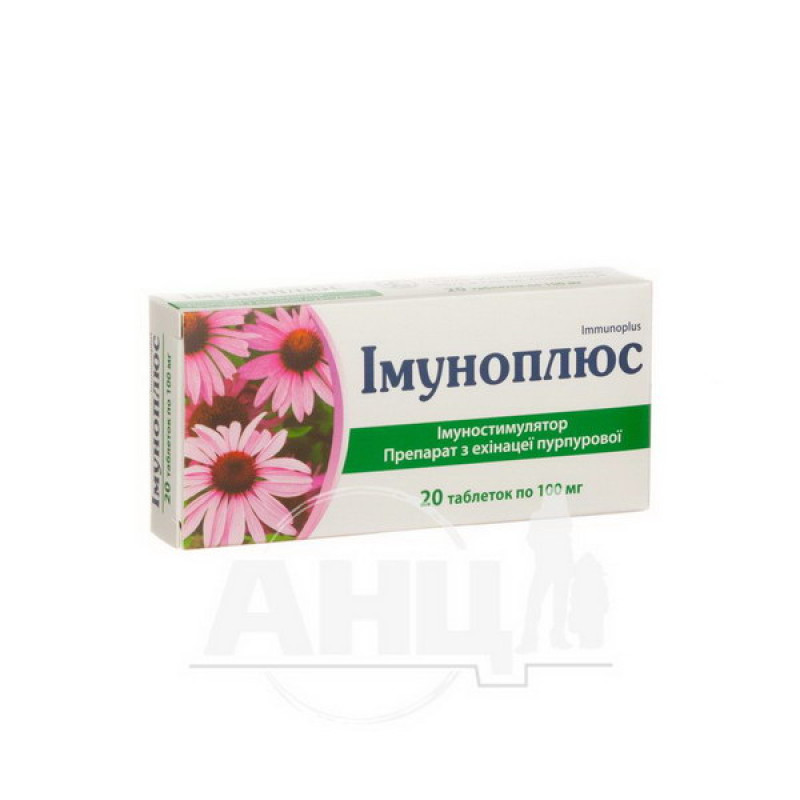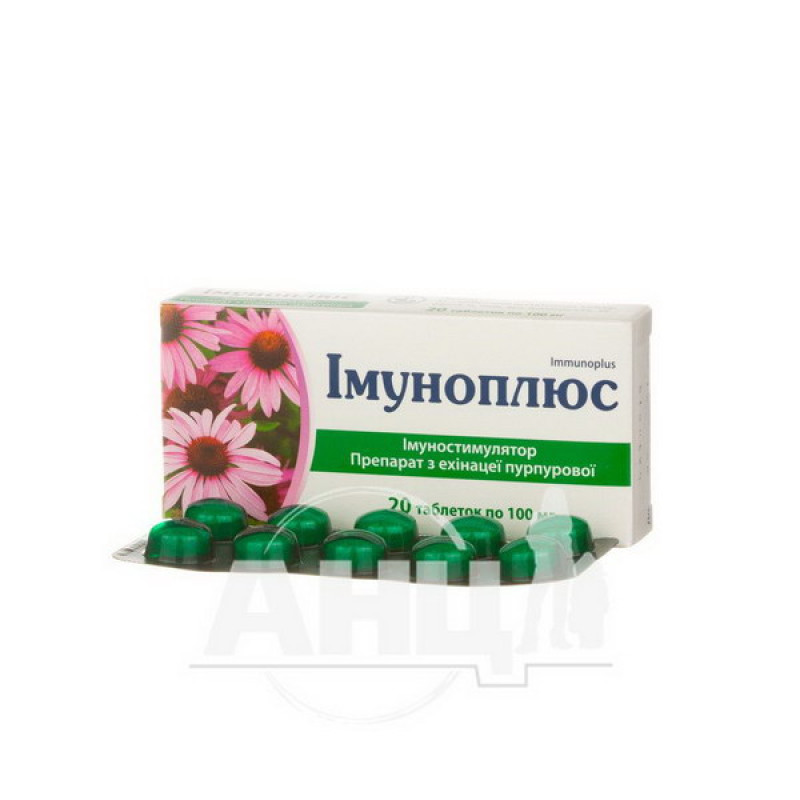Immunoplus tablets 100 mg blister No. 20

Pharmacological properties
Pharmacodynamics. plant biogenic stimulant, has immunomodulatory and anti-inflammatory effects, stimulates hematopoiesis in the bone marrow, resulting in an increase in the number of leukocytes and spleen PEC cells. activates mainly the cellular component of immunity, stimulates the phagocytic activity of macrophages and chemotaxis of granulocytes, promotes the release of cytokines, increases the production of interleukin-1 by macrophages, accelerates the transformation of b-lymphocytes into plasma cells, increases antibody formation and t-helper activity. increases the body's nonspecific resistance (including to influenza and herpes viruses).
Pharmacokinetics. Well absorbed in the gastrointestinal tract. Excreted from the body with urine and feces.
Indication
As part of combination therapy for frequent recurrences of infectious diseases of the respiratory and urinary tract.
At the first signs of SARS, prolonged use of antibiotics.
Application
The tablets can be dissolved, chewed or swallowed with liquid. The time of taking the drug does not depend on the time of eating.
Adults and children over 12 years of age take 1 tablet (100 mg) 2 times a day. The maximum daily dose is 4 tablets (400 mg).
Children aged 6-12 years are prescribed 1 tablet (100 mg) per day. The maximum daily dose for this age group is 1 tablet (100 mg).
Duration of treatment - 10 days with daily administration of the drug or 20 days with every other day administration. The maximum duration of use of the drug should not exceed 2 weeks (with daily administration). In chronic diseases, the course of treatment can be repeated after an interval of 2-3 weeks (after consultation with a doctor).
Contraindication
Hypersensitivity to the drug or to other plants of the Asteraceae family (chamomile, calendula, dandelion), tuberculosis, rheumatism, systemic connective tissue diseases (collagenoses), multiple sclerosis and other autoimmune diseases (systemic lupus erythematosus), chronic viral diseases, AIDS/HIV infection, neoplasms, primary immunodeficiency, immunosuppression, diseases of the leukocyte blood system (e.g. leukemia, agranulocytosis).
Side effects
Gastrointestinal: gastrointestinal disorders such as nausea, vomiting, diarrhea, abdominal pain.
Immune system: hypersensitivity reactions, including skin rash, itching, urticaria, angioedema, flushing; shortness of breath, dizziness, sudden decrease in blood pressure, Stevens-Johnson syndrome, bronchospasm with obstruction, asthma, anaphylactic shock. An association with the development of autoimmune diseases (disseminated encephalitis, erythema nodosum, immunothrombocytopenia, Evans syndrome, Sjögren-Larsen syndrome with renal tubular dysfunction) has been reported.
From the blood and lymphatic system: leukopenia with prolonged use of the drug (8 weeks).
Other: agitation, sleep disturbances.
Special instructions
Patients with atopic diseases and a tendency to allergies should consult a doctor before using the drug, as there is a risk of anaphylactic reactions.
The medicine contains sorbitol: 1 tablet contains 570 mg of sorbitol, which corresponds to 0.05 XE. When used according to the recommended dosage, each dose supplies the body with 1.14 g to 3.42 g of sorbitol. The medicine should not be used in case of hereditary fructose intolerance. It may also have a slight laxative effect.
If respiratory diseases have frequent relapses and long-term symptoms, manifested by difficulty breathing, fever, sputum mixed with pus or blood, you should consult a doctor. If the symptoms of the disease worsen or the body temperature rises during treatment, you should consult a doctor immediately.
In case of repeated complaints of urinary tract dysfunction, a medical examination is necessary, and the patient should be under regular medical supervision.
If there are repeated complaints of urinary tract dysfunction, a medical examination is necessary, and the patient should undergo regular medical examinations.
It is recommended to combine the drug with the use of vitamins A, E, and C.
Use during pregnancy and breastfeeding. Do not use.
Children. The drug is not recommended for children under 6 years of age.
The ability to influence the reaction rate when driving or operating other mechanisms. There are no special studies, but dizziness may occur when using the drug, so the drug should be used with caution when driving or operating other mechanisms.
Interactions
Due to its immunostimulating effects, echinacea may reduce the effectiveness of drugs that have an immunosuppressive effect.
The drug is not recommended for use simultaneously with drugs that have a hepatotoxic effect, such as amiodarone, methotrexate, ketoconazole, and steroids.
It is not excluded that the effect may be enhanced or weakened with concomitant use of drugs whose elimination depends on the activity of P450, CYP 3A or CYP 1A2 isomers.
Overdose
Treatment: symptomatic therapy, gastric lavage, enterosorbents.
Storage conditions
At a temperature not exceeding 25 °C
There are no reviews for this product.
There are no reviews for this product, be the first to leave your review.
No questions about this product, be the first and ask your question.












